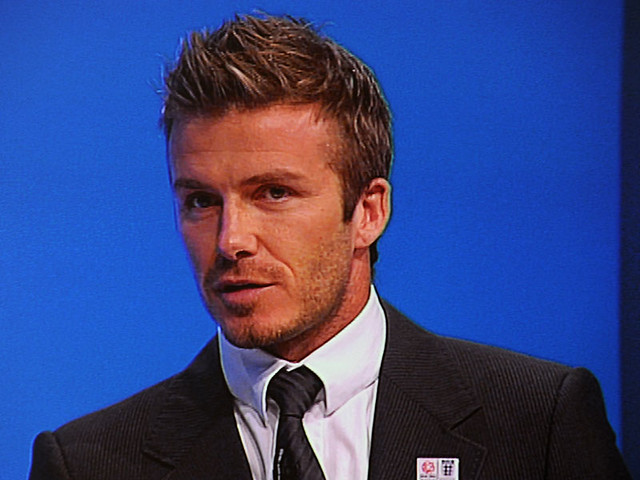David Beckham’s extraordinary global media appeal made him the definitive megastar of his generation. But his abilities as a footballer have been unfairly overlooked 
It had been a solid performance from Manchester United, nothing more. Goals from Eric Cantona and Denis Irwin had United 2-0 up against a poor Wimbledon side on a late summer’s day at Selhurst Park in 1996. But then a young upstart from the club’s academy scored from the halfway line and football changed for good. That was the real beginning of David Beckham’s career. There had been plenty of first team appearances and a loan spell at Preston North End, but that goal and its celebration – the arms held aloft, the wide, boyish grin – announced the arrival of the world’s first truly global superstar of the modern footballing age. 17 years and £165 million later, it is at an end.
About time, some might argue. Beckham’s appearances for Paris Saint-Germain have been sporadic, for some confirming suspicions that the palava surrounding his recruitment was a publicity stunt and the extension of Beckham’s career merely an afterthought to the club’s primary objective of media ubiquity and European domination. But this is how it has been since he left Manchester United. Beckham’s seemingly insatiable appetite to keep playing the game has been matched, step for step, by the world’s equally ravenous desire to consume his astonishing marketability. Until his departure to Real Madrid, Beckham’s ability had not been questioned. He formed part of what remains one of the best midfield units the game has seen, playing alongside Roy Keane, Paul Scholes and Ryan Giggs in United’s treble winning season of 1999.
His peerless passing, crossing and free-kick prowess came to define him as a player, despite his longing for a more active role in central midfield. But even by this point, Beckham’s contributions on the field were being overshadowed by his celebrity status and his manager was unimpressed. “He was never a problem until he got married,” said Ferguson in 2007.
By 2001 the Spice Girl wife, the never-ending endorsements and the haircuts were beginning to grate with the man who had told Beckham to “come back to where people love you” after he was sent off against Argentina in the 1998 World Cup. Beckham, like Paul Ince before him, had become too big for his boots in the manager’s eyes. But Beckham, in reality, had already become more than just a footballer. Ferguson was right: he had become bigger than Manchester United, a global superstar adored and idolised by millions – a cult of personality in the truest sense. Signed by Real Madrid as much for his celebrity as he was for his football he was nevertheless loved by Madrid fans for his dedication to the game, a quality of the man that is sometimes forgotten.
When it came to his England career in particular, Beckham was tireless, thinking nothing of showing up to sit on the bench for meaningless friendlies. “I feel that now is the right time to retire from football at the highest level,” said Beckham in his statement. Many would argue, however, that his move to Los Angeles Galaxy marked the end of his play at the highest level. Perhaps, in truth, he knew this and his loan spells at AC Milan felt like a final throw of the dice and at the time, an attempt to prove to Fabio Capello that he could still cut it. He did, in fact, make decent contribution in Italy despite a distinct lack of pace. His time at PSG can safely be called a non-starter, though his decision to donate his wages to charity should be applauded nonetheless.
This, of course, is also why Beckham has become such an icon. Despite the money that has surrounded him – the astronomical contracts, the management by Simon Fuller, the endless advertising – Beckham has remained a pin-up of family wholesomeness. His management know this of course and his niceness has been as marketable as any other element of his career.
Yes, the question of how much anyone can actually know a man without meeting him is certainly debatable, but it would be tough to contend that Beckham appears anything other a decent man. If Beckham can be accused of following the money in the latter stages of his career, the money has also followed him. He is the first modern-day footballer to combine a graceful talent on the pitch with astonishingly astute sense of business. He turned Premiership football into an explosive global phenomenon setting the stage for the multi-billion pound takeovers that have come to define the current makeup of European football. He remains the world’s biggest sports personality and that is what we will bombarded with for the next week. But at his peak, he was one of most naturally gifted footballers this country has produced and that, ultimately, is how his career should be remembered.
